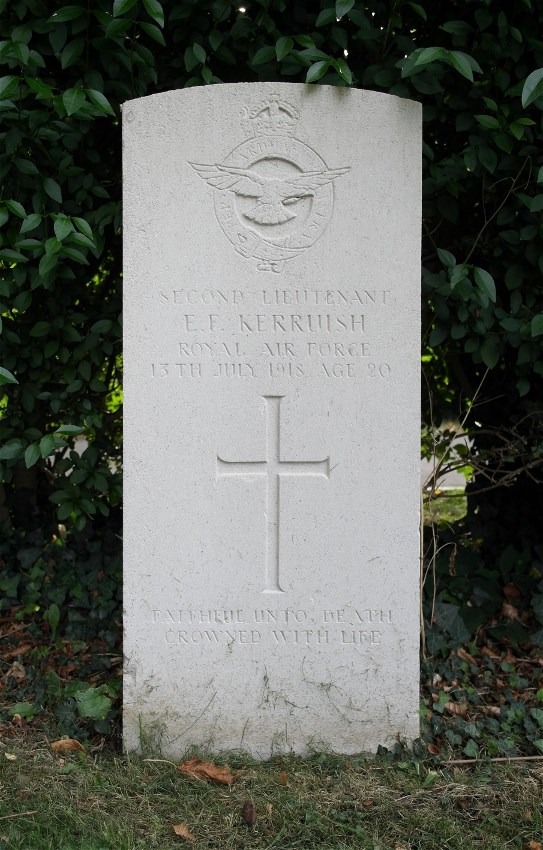
Researched by Will Young.
Born on 20th July 1897 at Port Elgin, Ontario, Canada, Evan Kerruish was destined to be burried in distant Catterick at the age of 20. His parents were the Rev. Thomas and Mrs Maria Kerruish of Hamilton, Ontario.
He enlisted into 153 (Wellington) Battalion of the Canadian Expeditionary Force on 6th October 1915. He sailed from Halifax, Nova Scotia on the sister ship of the Titanic, the SS Olympic on 29th April 1917 and landed at Liverpool on 7 May. Kerruish was commissioned into the Royal Naval Air Service on 9th October 1917, serving with Torpedo Squadron No 1. The cause of his death on 13th July 1918 and reason for burial at Catterick are unknown.

Explore more memories from the ribbon
-
Richard Adams
Meryl Abbey sent us some information about her great uncle, Richard William Adams. Richard served with the Yorkshire Regiment, arriving in France on 25th March 1915. Little is known about his service, but he served as 10438 Lance Corporal R Adams. He is buried at Bethune Town Cemetery having died on 30 August 1915. He was awarded the 1915 Star, the British War medal and the Victory medal.
-
James Allen
Judith Farrah told us about her great-grandfather James Allen, who’s joinery business contributed to the war effort on the Home Front. “James Allen was born in 1855 in Newbiggin, Richmond. He was originally called James Thistlethwaite but changed his name to Allen, which was his stepfathers name. He apprenticed with William Raworth, learning to be a joiner, and married his daughter Matilda. By 1901 he had set up his own joinery business known as James Allen & Son Ltd and worked on the Kursaal (later known as The Royal Hall) in Harrogate.” During the First World War, James did not join the armed forces but used his joinery business to create boxes for munitions. Static trench warfare required huge numbers of shells; the First World War became a war of production. Hundreds of manufacturing companies, including James’, were commandeered for munitions production. As men were sent to the trenches, women moved into the factories. Some factories’ workforce was almost entirely female, and this was true for James’ business.
-
Arthur Godman
Arthur was born at Smeaton Hall , Great Smeaton, Northallerton, Yorkshire on the 9th September 1877. He was the son of Colonel A. F. Godman. He was educated at Rugby School and was commissioned 2nd Lieutenant, Yorkshire Regiment in May 1898. Whilst serving in India he wrote two articles for The Green Howrads Gazette. One was about ‘G’ Company’s donkey! Apparently awarded an Army Temperance Medal despite having a taste for alcohol! Advancing to Lieutenant in November 1900 he saw service in Somaliland. Promoted Captain in January 1906 and, after a posting in South Africa, returned to the UK to serve as Adjutant for the University of London Officer Training Corps. He was appointed Staff Captain attached to the 21st Infantry Brigade in 1914. Severely wounded at Ypres on the 30th October 1914, on recovery he was posted to the General Staff in France. Promoted Major in August 1915 he was attached to the 4th Brigade, Royal Flying Corps. He served as Brigade Major during the Battle of the Somme and advanced to Temporary Lieutenant Colonel, Assistant Adjutant General, on the RFC staff from July 1917. By the end of the war he was a Brigadier-General and was confirmed as a Wing Commander in August 1919. The following month he was posted as Assistant Commander, RAF Cranwell. He was posted to RAF HQ India at Simla being promoted to Group Captain in June 1923. Returning the following year to the UK he served consecutively as: Officer Commanding, School of Technical…
